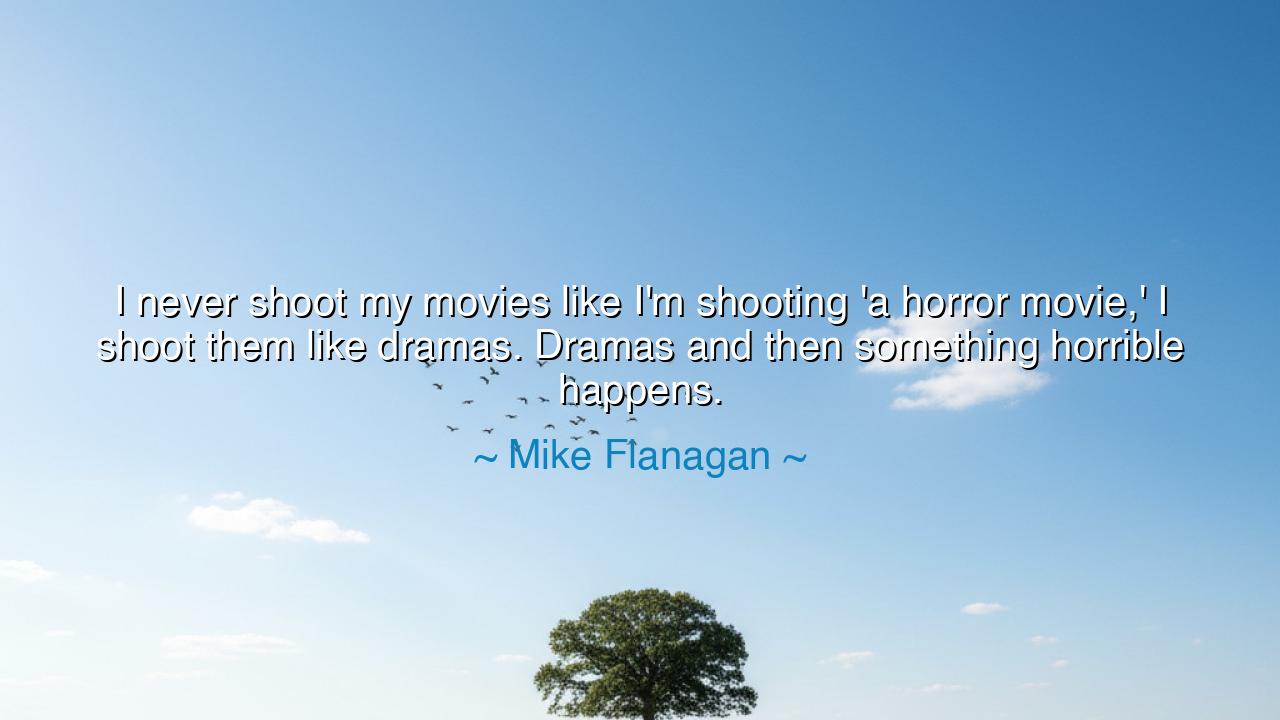
I never shoot my movies like I'm shooting 'a horror movie,' I
I never shoot my movies like I'm shooting 'a horror movie,' I shoot them like dramas. Dramas and then something horrible happens.






Ah, the wisdom of Mike Flanagan, a filmmaker who understands the deep and profound connection between drama and horror. When he says, "I never shoot my movies like I'm shooting 'a horror movie,' I shoot them like dramas. Dramas and then something horrible happens," he reveals an essential truth about the human experience—that horror does not exist in isolation, but is born from the depths of human emotion. In his films, it is not the shock or scare that drives the story, but the human connections, the struggles, and the tragic beauty of the characters. The horror, in this context, is not simply an external force, but a reflection of the internal turmoil that we all face.
In the ancient world, the great tragedies and epic stories were often grounded in human nature, in the raw emotions and moral dilemmas that define our lives. Sophocles, in works like "Oedipus Rex," and Euripides, in his powerful plays, delved into the human psyche, showing that the true horror lies not in supernatural forces, but in the consequences of human choices, fate, and internal conflict. In this way, the ancient playwrights did not create stories solely for the spectacle of violence or fear, but for the emotional resonance that comes from the depth of human experience. Flanagan, like these great storytellers, understands that horror arises not from a world of external threats, but from the fractures within ourselves, the darkness that resides in our hearts, minds, and souls.
The great Greek tragedies, though filled with suffering and catastrophe, were ultimately meditations on human strength, moral struggle, and the inexorable flow of fate. Consider the figure of Ajax in Sophocles’ play. He is a warrior of unparalleled strength and honor, yet his downfall comes not from a lack of courage but from his internal turmoil—his inability to cope with shame, honor, and the actions of his fellow soldiers. The true horror in his story is not in the physical battles he faces, but in the psychological battle he cannot overcome. Flanagan’s approach to horror, then, is akin to this ancient tradition: it is not about external threats but about the inner horror that defines the human condition. Flanagan's dramas, like the ancient tragedies, are a study in human vulnerability.
Take, for example, Shakespeare’s "Macbeth," where the horror of murder and betrayal is not just physical, but deeply emotional. Macbeth, driven by his own ambition and guilt, is consumed by the horrors of his actions, seeing ghosts and hearing voices. The tragedy is not the act of murder itself, but the psychological disintegration that follows—the unraveling of his mind and soul. Flanagan’s films, in a similar way, focus on the inner lives of his characters—their fears, regrets, and desires—making the horrors they face not mere spectacles, but expressions of their internal struggles. The horror is not just a plot device, but a manifestation of their deepest emotions and fears.
In Flanagan’s work, the true lesson is that the horrors we face in life—whether external or internal—are deeply connected to the emotional and psychological conflicts we carry within us. The difficulties and tragedies we endure are not simply random events, but reflections of our own vulnerabilities and human frailties. It is in this way that his films, like the Greek tragedies, are more than just stories of terror—they are stories of the soul’s struggle, of personal growth, and of the consequences of our choices. Flanagan invites us to examine our own emotional landscapes, showing that the greatest horrors are not those that exist in the world around us, but those that exist in the very core of our being.
The lesson for us, then, is clear: the darkness we confront in the world often mirrors the darkness we carry within. Just as Flanagan creates films that explore the human experience through the lens of horror, so too must we explore our own inner worlds. Instead of being afraid of the darkness, we must embrace it, understanding that within it lies not just fear, but growth—the opportunity to confront the parts of ourselves we often shy away from. It is in confronting these inner battles, these personal horrors, that we find true strength.
Thus, the call to action is simple: embrace the complexities of the human experience. Face the darkness within, not with fear, but with the courage to understand and transform it. Like Flanagan’s characters, who confront their inner demons, we must acknowledge the horrors of our own fears, regrets, and mistakes, and use them as opportunities for growth. Whether in art, in life, or in our relationships, the most profound change comes not from avoiding the shadows, but from learning to live with them, understanding their place in the larger story of who we are. Only then, like the heroes of ancient drama, can we confront our own tragedies and emerge stronger, wiser, and more whole.






AAdministratorAdministrator
Welcome, honored guests. Please leave a comment, we will respond soon